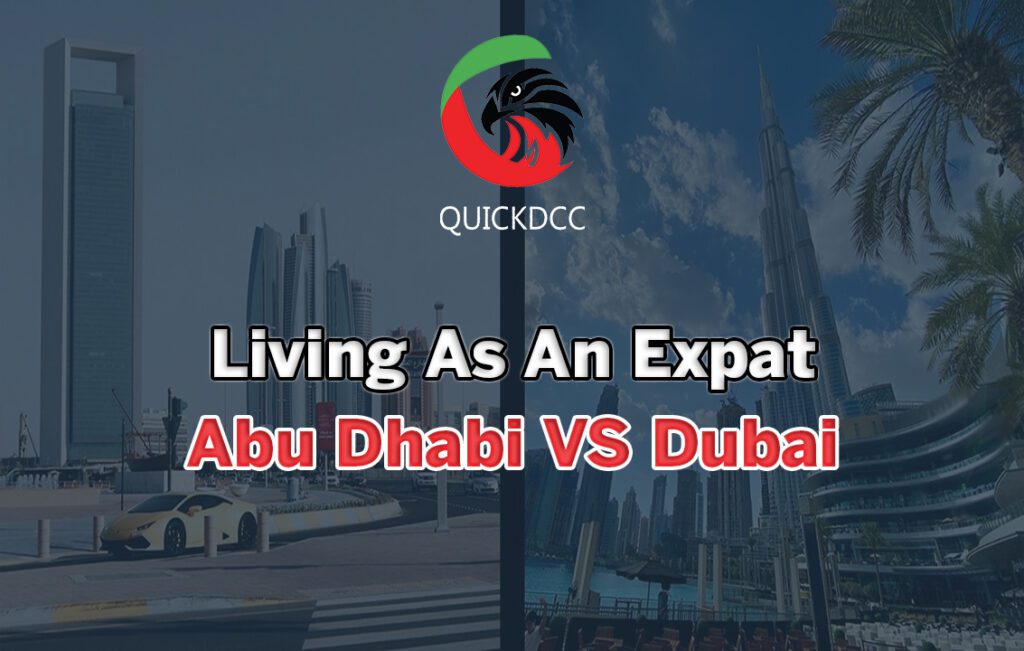As the sun dips below the horizon, casting a golden hue over the magnificent skylines of Abu Dhabi and Dubai, prospective expats find themselves at a crossroads of opportunity and lifestyle. As an expat, the UAE presents a compelling blend of rich cultural heritage and cutting-edge modernity. Still, when choosing between these two iconic cities, each offers its distinct charm. Dubai dazzles with its fast-paced energy, world-famous attractions, and thriving business scene that draws professionals from around the globe. In contrast, Abu Dhabi invites you into a realm of serene luxury where tradition intermingles effortlessly with contemporary living.
From towering skyscrapers to breathtaking waterfronts, both cities boast unparalleled amenities that cater to every taste and preference. However, beyond their stunning façades lies a more profound difference in lifestyle that can significantly impact your experience as an expatriate. Will you thrive amidst Dubai’s bustling nightlife and cosmopolitan atmosphere or find contentment in the tranquil elegance of Abu Dhabi’s cultural treasures? This article delves into the nuances of living as an expat in these two remarkable cities—offering insights to help you make an informed decision about your new adventure in the heart of the UAE.
The Top Attractions in Abu Dhabi
Sheikh Zayed Grand Mosque
The Sheikh Zayed Grand Mosque is a marvel of Islamic architecture. Its stunning white domes and intricate marblework make it one of the most beautiful mosques in the world.
Emirates Palace
A symbol of luxury, Emirates Palace is more than just a hotel—it’s a palace. This opulent landmark offers a glimpse into the extravagant lifestyle of Abu Dhabi’s elite, featuring lush gardens, a private beach, and world-class dining options.
Ferrari World
Ferrari World on Yas Island is a must-visit for thrill-seekers. It’s home to the world’s fastest roller coaster and various Ferrari-themed attractions that cater to car enthusiasts and families alike.
Yas Island
Yas Island is a hub of entertainment and leisure. From Yas Marina Circuit, which hosts the Abu Dhabi Grand Prix, to Yas Waterworld, it offers numerous activities that make it a favorite among residents and tourists.

The Top Tourist Destinations in Dubai
Burj Khalifa
As the tallest building in the world, the Burj Khalifa is an iconic landmark. Visitors can enjoy breathtaking views from its observation decks, dine in exclusive restaurants, and marvel at its stunning nighttime illuminations.
Dubai Mall
Dubai Mall is not just a shopping destination—it’s a world unto itself. Featuring an indoor aquarium, ice rink, and countless high-end shops and restaurants, it’s a shopper’s paradise and a hub of entertainment.
Palm Jumeirah
Palm Jumeirah is an artificial archipelago known for its luxury resorts and upscale living. It’s home to the famous Atlantis, The Palm, and offers a range of beachside activities and fine dining experiences.
Dubai Miracle Garden
The Dubai Miracle Garden is a vibrant floral paradise. This enormous garden features intricate flower displays and designs that change seasonally, providing a colorful escape from the city’s hustle and bustle.
Embracing the Culture and Lifestyle
Local Customs
Both Abu Dhabi and Dubai embrace a rich cultural heritage. Understanding local customs is crucial for integrating smoothly into life as an expat. Respect for Islamic traditions, dress codes, and etiquette is essential in both cities.
Festivals and Cuisine
Each city celebrates a variety of festivals and offers unique culinary experiences. Abu Dhabi hosts cultural events like the Abu Dhabi Film Festival, while Dubai is known for its vibrant food scene and events like the Dubai Food Festival. Exploring local cuisine, from traditional Emirati dishes to international fare, is a delightful part of expat life.
Expat Community
Both cities boast a thriving expat community. Dubai’s diverse population means various cultural communities and social clubs. Abu Dhabi offers a more tranquil environment but ample opportunities for expats to connect through multiple groups and events.
Housing and Transportation
Housing Options
Abu Dhabi
Abu Dhabi generally offers more affordable housing than Dubai. The city features a variety of accommodations, from modern apartments to spacious villas. Neighborhoods like Al Reem Island and Al Raha Beach are popular among families due to their amenities and school proximity.
Dubai
Dubai is known for its luxurious real estate market. While finding more affordable options is possible, the city is home to many high-end properties, particularly in Downtown Dubai and Dubai Marina. Dubai’s dynamic lifestyle attracts a younger, professional crowd, leading to a range of modern apartments and high-rise buildings.
Transportation Infrastructure: Abu Dhabi vs Dubai
When choosing between Abu Dhabi and Dubai, understanding their transportation infrastructure can significantly impact your daily life as an expat. Both cities offer distinct approaches to commuting and transportation, reflecting their unique urban landscapes and priorities.
Transportation in Abu Dhabi
Abu Dhabi’s transportation system is characterized by its reliance on private vehicles and taxis. The city’s public transportation infrastructure is still developing, so getting around often requires a personal car. This reliance on private transport can be attributed to the city’s spread-out layout and the relative newness of its public transit network.
Current Public Transportation
Recently, Abu Dhabi has made strides in improving its public transportation options. New bus routes have been introduced to provide better connectivity across the city. However, the public bus system is less extensive or frequent than those in more transit-oriented cities. The buses mainly serve key routes and are beneficial for specific travel needs, but they may not always offer the convenience or coverage required for daily commuting.
Private Vehicles
Given the current state of public transport, owning a vehicle is often the most practical choice for residents. Cars provide flexibility and ease of movement, particularly in a city where many amenities and residential areas are spread out. The road network in Abu Dhabi is well-maintained and modern, making driving a smooth experience. Parking is generally available, although it can be limited in busy areas.
Taxis and Ride-Hailing Services
Taxis are widely available and offer a reliable alternative for those who do not own a car. Ride-hailing services like Uber and Careem also provide additional convenience and flexibility. While these services are accessible, they may not always be as cost-effective as owning a car, especially for regular commutes.
Transportation in Dubai
Dubai boasts a comprehensive and modern public transportation system that distinguishes it from Abu Dhabi. The city’s extensive network includes metro lines, trams, buses, and water taxis, making it easy for residents and visitors to navigate without needing a private vehicle.
Metro System
The Dubai Metro is a cornerstone of the city’s public transport infrastructure. It consists of two main lines—the Red Line and the Green Line—that connect significant districts, including downtown areas, business hubs, and residential neighborhoods. The metro is known for its efficiency, punctuality, and cleanliness, making it a popular choice for daily commuting. Its stations are well-integrated with other forms of transport, enhancing its convenience.
Trams and Buses
The Dubai Tram and bus systems complement the metro. The Dubai Tram serves areas like Dubai Marina and Al Sufouh, providing a seamless link to the metro network. Buses cover many routes across the city, offering accessibility to areas not served by the metro or tram. The bus system is extensive and generally reliable, supporting various commuting needs.
Water Transport
Dubai’s water transport options, including abras (traditional wooden boats) and water taxis, add another dimension to the city’s transportation network. These services are top-rated in areas like Dubai Creek and the Dubai Marina, offering scenic and practical travel across the water.
Taxis and Ride-Hailing Services
In addition to public transport, Dubai has a well-developed network of taxis and ride-hailing services. Taxis are abundant and quickly hailed on the street or booked via phone apps. Ride-hailing services such as Uber and Careem also operate extensively, providing additional convenience and options for getting around.
Cost of Living Comparison: Abu Dhabi vs. Dubai
Understanding the cost of living is crucial when considering a move to Abu Dhabi or Dubai. Both cities offer a high standard of living, but notable differences in housing and transportation costs can influence your overall budget. Here’s a detailed comparison to help you make an informed decision.
Housing Costs
Abu Dhabi
Abu Dhabi’s housing tends to be pricier, particularly in desirable locations. The city’s real estate market reflects its status as the capital of the UAE, with premium properties commanding higher rents. For example, the average monthly rent for a one-bedroom apartment in the city center of Abu Dhabi is approximately 5,500 AED. This cost can vary based on the specific neighborhood, the quality of the apartment, and additional amenities. Areas like Al Reem Island and Saadiyat Island are known for their upscale living options, which can significantly increase rental prices.
Dubai
In comparison, Dubai offers relatively more affordable housing options. The average monthly rent for a one-bedroom apartment in the city center is about 4,500 AED. Dubai’s diverse real estate market includes various neighborhoods with different price ranges, allowing for more flexibility in choosing a suitable living arrangement. Areas such as Downtown Dubai and Dubai Marina may still command higher rents, but overall, the city provides a wider range of options for various budgets.
Transportation Costs
Abu Dhabi
Abu Dhabi’s transportation infrastructure relies heavily on private vehicles and taxis. The city’s public transport system is less developed than Dubai’s, leading many residents to use their cars for daily commuting. For those who drive, gasoline costs are relatively low, with a liter priced at approximately 2.39 aed. Although owning a vehicle is common, taxis are also available and can be a convenient option for occasional travel, though they may add up in cost over time.
Dubai
Dubai features a more extensive and developed public transportation network, including the metro, buses, and trams. This robust system offers a cost-effective alternative to private vehicles. For instance, a liter of gasoline in Dubai is around 2.20 aed, slightly cheaper than in Abu Dhabi. The metro system, in particular, provides an affordable and efficient way to travel across the city, with prices starting at just a few dollars per trip, depending on the distance traveled. The tram and bus services further enhance the public transport options, making it easier and more economical to get around without a car.
Healthcare Expenses: Abu Dhabi vs. Dubai
When moving to a new city, healthcare costs are a significant factor to consider. Abu Dhabi and Dubai offer high-quality healthcare services, but there are essential differences in the cost and availability of private and government healthcare between the two cities.
Healthcare in Abu Dhabi
Private Healthcare Costs
In Abu Dhabi, private healthcare services are known for their high standards, but they come at a premium. Private hospitals and clinics offer state-of-the-art facilities, advanced medical technology, and specialized treatments. The costs for consultations, procedures, and treatments at these facilities can be high, making private healthcare an expensive option for those without comprehensive insurance coverage.
Government Healthcare Services
On the other hand, government healthcare services in Abu Dhabi provide a more affordable alternative. The public healthcare system is well-regarded and offers various services, including general consultations, emergency care, and specialist treatments, at lower costs than private providers. Government hospitals are equipped with modern facilities and staffed by qualified medical professionals. However, access to these services may sometimes involve longer wait times and may not offer the same level of personalized care as private institutions.
Healthcare in Dubai
Private Healthcare Costs
Dubai also boasts a high standard of private healthcare, similar to Abu Dhabi. Private hospitals and clinics in Dubai are known for their excellent service, modern facilities, and specialized medical care. The costs associated with private healthcare in Dubai are generally high, and the expenses can add up, particularly for long-term treatments or specialist consultations. Comprehensive health insurance is highly recommended to manage these costs effectively.
Government Healthcare Services
Dubai’s government healthcare system provides a more cost-effective option for residents. Public hospitals and clinics offer quality medical care at a lower cost than private facilities. These government-run institutions are well-equipped and staffed by skilled professionals, ensuring that essential healthcare services are accessible to a broader population. Like Abu Dhabi, while government healthcare in Dubai is budget-friendly, it may come with longer waiting periods and less personalized attention than private healthcare options.
Education and Family Life: Abu Dhabi vs. Dubai
When considering a move to Abu Dhabi or Dubai with a family, the availability and quality of education and family-oriented activities are crucial factors. Both cities offer diverse educational options and various activities designed to cater to families, but some differences are worth noting.
Schools and Educational Institutions
Educational Options in Abu Dhabi
Abu Dhabi provides various educational choices, including international schools, private institutions, and public schools. International schools in Abu Dhabi cater to various curricula, such as the British, American, and International Baccalaureate (IB) programs, and are popular among expatriate families. These schools often have high tuition fees, reflecting their premium services and facilities. Private institutions, while offering quality education, can also be quite costly.
Public schools in Abu Dhabi are available and offer a solid standard of education. They follow the UAE’s national curriculum and are more affordable than private and international schools. However, the language of instruction in public schools is Arabic, which may be a consideration for non-Arabic-speaking families. Despite this, many expatriates opt for private or international schools due to the bilingual or multilingual environment they offer.
Educational Options in Dubai
Like Abu Dhabi, Dubai has many educational institutions, including international, private, and public schools. International schools in Dubai provide various curricula, including British, American, and IB, and are known for their high education standards. The cost of tuition at these schools can be substantial, making it essential for families to budget accordingly.
Dubai also has several high-quality private schools offering diverse educational programs. These schools often have modern facilities and extracurricular activities that enhance the learning experience. Public schools in Dubai offer an excellent standard of education. Similar to Abu Dhabi, they follow the UAE national curriculum. They are more cost-effective than private and international schools but primarily operate in Arabic.
Family-Oriented Activities
Family Activities in Abu Dhabi
Abu Dhabi is renowned for its family-friendly atmosphere, with many attractions and activities for all ages. Some highlights include:
- Theme Parks: Abu Dhabi is home to several exciting theme parks, such as Ferrari World, Yas Waterworld, and Warner Bros. World, which provide thrilling experiences and entertainment for the entire family.
- Beaches: The city features beautiful beaches like Corniche Beach and Saadiyat Beach, where families can enjoy sunbathing, swimming, and recreational activities.
- Cultural Sites: For a more cultural experience, families can visit the Sheikh Zayed Grand Mosque or the Louvre Abu Dhabi, which offer educational and enriching experiences.
Family Activities in Dubai
Dubai offers an extensive range of entertainment options and family-oriented activities:
- Parks and Gardens: The city has numerous parks and green spaces, such as Safa Park and Dubai Miracle Garden, which provide ample outdoor activities and picnic opportunities.
- Cultural Centers: Dubai features cultural centers like the Dubai Opera and the Dubai Museum, offering educational and cultural experiences.
- Family Resorts: Dubai’s resorts, such as Atlantis The Palm and Jumeirah Beach Hotel, offer luxurious amenities, water parks, and family-friendly activities catering to relaxation and adventure.
Final Note:
Choosing between Abu Dhabi and Dubai depends on your lifestyle and preferences. Abu Dhabi offers a peaceful, family-oriented environment, while Dubai provides a fast-paced, cosmopolitan experience. Consider your priorities, such as cost of living, housing, and healthcare. Whichever city you choose, ensure comprehensive health insurance for peace of mind. Explore both cities to make the best decision for your expat journey in the UAE.
Frequently Asked Questions:
Abu Dhabi is known for its relaxed and traditional atmosphere, while Dubai offers a bustling cosmopolitan environment. Abu Dhabi tends to have a higher cost of living, whereas Dubai provides more affordable options and a dynamic lifestyle.
Visit the Sheikh Zayed Grand Mosque, Emirates Palace, and Yas Island in Abu Dhabi. In Dubai, explore the Burj Khalifa, Dubai Mall, Palm Jumeirah, and Dubai Miracle Garden.
Immerse yourself in local customs, participate in cultural festivals, and try traditional cuisine to experience each city’s unique heritage fully.
Consider career opportunities, quality of life, infrastructure, and personal preferences. Evaluate what matters most to you in a city, including community, cultural offerings, and lifestyle.
Evaluate the cost of living, housing options, transportation, healthcare, and educational opportunities. Consider your lifestyle preferences: a quieter, family-friendly environment or a vibrant, fast-paced city.
Related Articles:
- How to Get a Teaching License in Dubai, UAE
- How To Cancel Maid Visa In Dubai
- Comprehensive Guide To Dubai Partner And Investor Visas
- Company Trade License Renewal Services in Dubai, UAE
- How To Open Offshore Company In Dubai
- How much is an E-Commerce License in Dubai?
- How to Register a Company in the DMCC Free Zone
- E-Trader VS E-Commerce License in Dubai
- Dubai Visa: Apply Tourist & Visit Visa Online
- DHA & MOH Medical Typing Services for UAE
- How To Check And Pay RTA Traffic Fines In Dubai, UAE
- How To Renew a Maid Visa In Dubai
- What Is The Best Business To Start In Dubai 2025?
- Complete Guide to UAE Amnesty 2024


